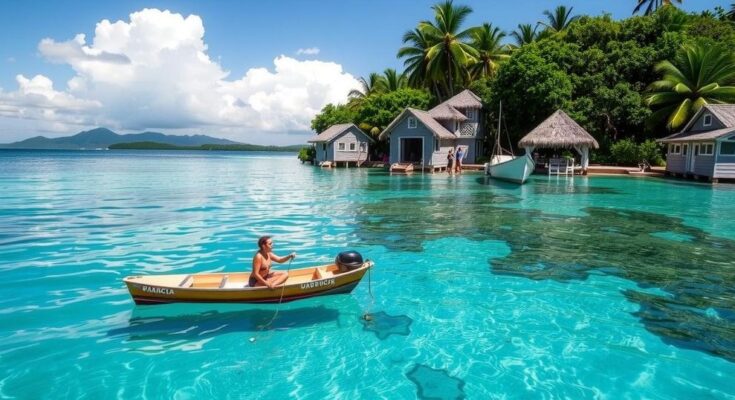Seychelles is advancing its Blue Economy agenda by offering training workshops on maritime boundary delimitation and marine biodiversity conservation. With Minister Jean-Francois Ferrari emphasizing capacity building’s importance, Seychelles seeks to solidify its role in global ocean governance. The recent workshops culminated in certificate presentations, highlighting the nation’s commitment to managing its vast Exclusive Economic Zone sustainably.
Seychelles is reinforcing its leadership in ocean governance by providing comprehensive training focused on maritime boundary delimitation and marine biodiversity conservation, essential components of the global Blue Economy. During a recent session, Fisheries and Blue Economy Minister Jean-Francois Ferrari emphasized the critical need for capacity building in these sectors, especially for a small island developing state like Seychelles, which boasts an extensive Exclusive Economic Zone (EEZ) of 1.4 million square kilometers.
Minister Ferrari stated, “Ocean governance is central to the country’s economy, environment, and national identity, which is why investment in capacity building in the various areas of the Blue Economy is essential.” The training involved two important workshops: one on Biodiversity Beyond National Jurisdiction (BBNJ) and another on Maritime Boundary Delimitation, where 14 and 24 participants received their certificates, respectively. These initiatives are meant to enhance national capabilities in marine governance.
Currently, Seychelles has established 90 percent of its maritime boundaries, with ongoing negotiations pertaining to the remaining area adjacent to Madagascar, which requires diplomatic finesse. Chrissant Barbe, Director General of the Department of the Blue Economy, stated, “The unmarked area is between Seychelles and Madagascar, where it is more of a diplomatic work.” This knowledge is vital for the management of ocean resources and sovereignty.
Additionally, Seychelles is a pioneer in recognizing the significance of the BBNJ Agreement, an international treaty aimed at the sustainable use and conservation of marine biodiversity in international waters. Having became the fourth country globally and the first in Africa to ratify this treaty, this workshop equipped participants with the necessary understanding of the treaty’s implications for marine governance, a pivotal aspect for the nation.
In sum, Seychelles’ dedication to maritime boundary delimitation and biodiversity conservation signifies its active role in shaping sustainable practices within the Blue Economy, affirming its commitment to managing ocean resources for environmental and economic sustainability.
The concept of the Blue Economy focuses on leveraging ocean resources in a sustainable manner to foster economic growth while safeguarding marine biodiversity. For small island nations like Seychelles, whose economies are heavily reliant on fisheries, tourism, and renewable energy derived from marine ecosystems, the Blue Economy model is especially relevant. Training in maritime boundary delimitation and biodiversity conservation is essential for ensuring effective governance of these vast oceanic resources, which is a critical concern for maintaining national sovereignty and promoting international cooperation in marine conservation.
In conclusion, Seychelles is actively promoting its Blue Economy agenda through training programs that enhance expertise in maritime boundary delimitation and marine biodiversity conservation. This commitment not only underscores Seychelles’ leadership role in international ocean governance but also ensures the sustainable management of its extensive oceanic resources for the benefit of future generations. The integration of local expertise in these domains is pivotal for addressing ongoing challenges in marine management and conservation.
Original Source: www.seychellesnewsagency.com




